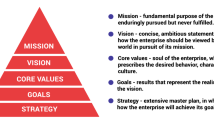Abstract
The ongoing financial crisis is forcing governments to consider leaner (less resource intensive) forms of public service delivery. This is a difficult process, especially since recent private sector scandals demand that governments become more vigilant. Public-private collaboration (PPC) needs to address this ‘lean yet vigilant’ challenge. However, PPCs have proven to take a long time to establish and bring to fruition. Hurdles that delay the achievement of goals include the need to agree on standards in an environment with heterogeneous interests, changing laws and unclear revenue models. While literature on managing PPC hints towards the need for both compulsory measures (plan-driven, restrictive) and adaptive measures (learning-driven, leeway), case studies illustrating how these measures can be integrated in practice are scarce. Drawing on the Standard Business Reporting case in the Netherlands, this paper shows that both compulsory and adaptive measures are necessary to advance in multi-actor standardization processes. Our findings indicate that PPC managers need to impose with leeway by taking an engineering approach to architecture development yet providing leeway in the details.
Chapter PDF
Similar content being viewed by others
References
Osborne, S.: Public-private partnerships: theory and practice in international perspective. Taylor and Francis, London (2000)
Donahue, J.D., Zeckhauser, R.J.: Public-Private Collaboration. In: Moran, M., Rein, M., Goodin, R.E. (eds.) The Oxford Handbook of Public Policy. Oxford University Press, Oxford (2006)
Tan, Y.H., Bjørn-Andersen, N., Klein, S., Rukanova, B. (eds.): Accelerating Global Supply Chains with IT-Innovation. Springer, Berlin (2011)
Kerschbaumer, K.: Public-private partnerships in Eastern Europe: Case studies from Lithuania, Republika Srpska and Albania. Eurohealth 13, 7–9 (2007)
Reijniers, J.J.: Organization of public-private partnership projects: The timely prevention of pitfalls. International Journal of Project Management 12, 137–142 (1994)
van Veenstra, A.F., Janssen, M., Tan, Y.-H.: Towards an understanding of E-government induced change – drawing on organization and structuration theories. In: Wimmer, M.A., Chappelet, J.-L., Janssen, M., Scholl, H.J. (eds.) EGOV 2010. LNCS, vol. 6228, pp. 1–12. Springer, Heidelberg (2010)
de Bruijn, J.A., ten Heuvelhof, E.F., Veld, R.J.: Process Management. Why Project Management Fails in Complex Decision Making Processes. Kluwer Academic Publishers, Dordrecht (2002)
Kling, R., Lamb, R.: IT and Organizational Change in Digital Economies: A Sociotechnical Approach. In: Brynjolfsson, E., Kahin, B. (eds.) Understanding the Digital Economy. Data, Tools, and Research. The MIT Press, Cambridge (2000)
Kwak, Y.: A Brief History of Project Management. In: Carayannis, E.G., Kwak, Y., Anbari, F.T. (eds.) The Story Of Managing Projects: An Interdisciplinary Approach, pp. 1–9. Praeger Publishers, Westport (2005)
Hammer, M., Champy, J.: Reengineering the Corporation: A Manifesto for Business Revolution. Harper Business (1993)
Lundin, R., Söderholm, A.: A Theory of The Temporary Organization. Scandinavian Journal of Management 11, 437–455 (1995)
von Stamm, B.: Managing Innovation, Design and Creativity. John Wiley and Sons Ltd., Chichester (2003)
Dempsey, P.S., Goetz, A.R., Szyliowicz, J.S.: Denver International Airport: lessons learned. McGraw-Hill, New York (1997)
Loureiro, G., Curran, R.: Complex Systems Concurrent Engineering; Collaboration, Technology Innovation and Sustainability. Springer, London (2007)
Koppenjan, J.F.M., Klijn, E.H.: Managing Uncertainties in Networks. Routlegdge, London (2004)
Morris, P.W.G., Hough, G.H.: The Anatomy of Major Projects: A Study of Project Management. John Wiley & Sons, Chichester (1987)
Geraldi, J.G.: The balance between order and chaos in multi-project firms: A conceptual model. International Journal of Project Management 26, 348–356 (2008)
Bharosa, N., Janssen, M., Hulstijn, J., Van Wijk, R., De Winne, N.: Principles for launching Standard Business Reporting: Lessons learned from the Netherlands. DgO. ACM, Maryland (2011)
Debreceny, R., Felden, C., Ochocki, B., Piechocki, M.: XBRL for Interactive Data: Engineering the Information Value Chain. Springer, Berlin (2009)
Wimmer, M.A.: Integrated Service Modelling for Online One-stop Government. Electronic Markets 12, 149–156 (2003)
White, S., Miers, D.: BPMN Modeling and Reference Guide. Future Strategies Inc. Lighthouse Pt, FL (2008)
Author information
Authors and Affiliations
Editor information
Editors and Affiliations
Rights and permissions
Copyright information
© 2011 IFIP International Federation for Information Processing
About this paper
Cite this paper
Bharosa, N., van der Voort, H., Hulstijn, J., Janssen, M., de Winne, N., van Wijk, R. (2011). Impose with Leeway: Combining an Engineering and Learning Approach in the Management of Public-Private Collaboration. In: Janssen, M., Scholl, H.J., Wimmer, M.A., Tan, Yh. (eds) Electronic Government. EGOV 2011. Lecture Notes in Computer Science, vol 6846. Springer, Berlin, Heidelberg. https://doi.org/10.1007/978-3-642-22878-0_33
Download citation
DOI: https://doi.org/10.1007/978-3-642-22878-0_33
Publisher Name: Springer, Berlin, Heidelberg
Print ISBN: 978-3-642-22877-3
Online ISBN: 978-3-642-22878-0
eBook Packages: Computer ScienceComputer Science (R0)





